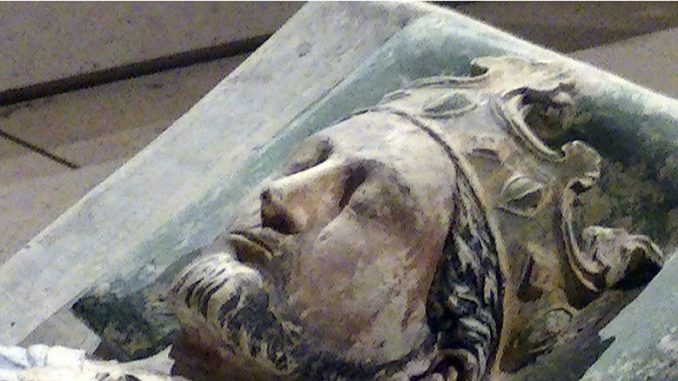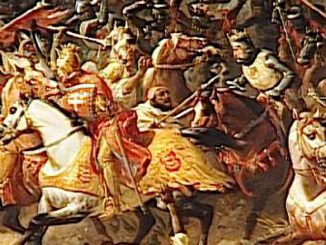
Effigy of King Richard I by Adam Bishop CC3.0
A King Is Born
While Richard Plantagenet is revered as one of the great warrior kings of England, he is perhaps best known as “the absent king.” This is due to the fact that during his reign from 1189-1199, he spent a total of six months in England. This aside Richard I was well known for his bravery which earned him the nickname “The Lionheart”. A name that has reached epic and mythological proportions, best seen in literary works such as Robin Hood and Sir Walter Scott’s novel Ivanhoe.
Richard Plantagenet came into the world September 8th in the year 1157 AD Although born in Oxfordshire England, Richard was a child of Aquitaine a part of Southern France. His native language was not English and throughout his life he spoke little of it.
He had four brothers and three sisters, the first of which died at a young age. Of the remainder; Henry was named heir to the English throne, Richard was to succeed his mother’s Aquitaine and Geoffrey was to inherit Brittany. John was the poorest to fair out, receiving nothing from his father. It is this action that gave him the name John Lackland.
At a young age of twelve, Richard pledged homage to the king of France for lands of his. At the age of fourteen, Richard was named the Duke of Aquitane in the church of St. Hillaire at Poitiers which was one of the lands made homage to the French King. Henry’s sons, who had been given lands but no real power revolted against their King father aided by their mother. In retaliation King Henry had Eleanor jailed. She remained there for many years.
Off To The Crusades
In 1183 the younger Henry died leaving Richard as the heir to the English throne. Another family dispute occurred when Richard received the lands of his brother. Henry was expected to give his Aquitaine to his brother John. Richard refused to give up the homeland of his mother. While this dispute over family land raged on, Richard learned of the tragic loss at Hattin, where the Crusaders had lost Jerusalem to the Saracen leader Saladin. Richard soon took up the cross of the crusades, much against his father’s approval.
In 1189, upon the death of Henry II, Richard was crowned king of England in Westminster Abbey London. One of his first actions was to free his mother from prison. His second was to begin to raise funds for his crusade known to history as the Third Crusade. He imposed a tax on the English people called a Saladin tithe as a means of aiding his war effort.
A King Imprisoned
After the Third Crusade, Richard began his homeward journey to England. Put ashore by bad weather he found himself in Austria home of Leopold, whom Richard had angered by actions during the crusade. Leopold captured King Richard and imprisoned him in his castle. Eager for a piece of the action the Emperor of Germany offered Leopold 75,000 marks for Richard taking him into custody in Germany.
Rumors ran rampant throughout England over the missing king. There is a legend that the troubadour Blondel heard his king singing in a castle and responded with a song that the both of them were sure to know. Whether true or not the fact remains that two Abbots were soon dispatched to journey for him through the network of the church. Even Eleanor, Richard’s mother wrote to the Pope for assistance in the matter. Richard was found and soon a ransom was set for his return to England. The sum was 150,000 marks an amount equal to three years of annual income and weighing at three tons in silver.
Return Of The King
Richard returned to England receiving a hero’s welcome. He forgave his brother John, by saying he was manipulated by cunning people and vowed to punish them and not his brother. Unfortunately for the King he returned to a land in financial troubles. The cost of the Crusade and his large ransom had tapped out the finances of the land. This monetary trouble was to plague him for his remaining five-year reign. He created a new great seal as a means to raise funds and made void all documents signed with the old.
Death Of A King
For such a brave and noble man, King Richard’s death came about in a rather strange way. In Chalus, Aquitaine, a peasant plowing his fields came upon a treasure. This treasure consisted of some gold statues and coins. The feudal lord claimed the treasure from his vassal, Richard in turn claimed the treasure from the lord, who refused. This prompted Richard to siege the village.
During the siege Richard was riding close to the castle without the protection of full armor. He spotted an archer with bow in hand on the wall aiming a shot at him. It is said Richard paused to applaud the Bowman. He was struck in the shoulder with the arrow and refused treatment for his wound. Infection set in and Richard the Lionheart died on April the 6th 1199. He was buried in the Fontvraud Abbey in Anjou France.
About Us
TemplarHistory.com was started in the fall of 1997 by Stephen Dafoe, a Canadian author who has written several books on the Templars and related subjects.
Read more from our Templar History Archives – Templar History

